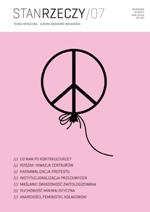Kontrkultura w Polsce – fakt czy fikcja? Lata 80. i 90. w wypowiedziach animatorów kontrkultury na łamach fanzinów
Counterculture in Poland: Fact or Fiction? Voices of the Counterculture Animators of the 1980s and 1990s in Fanzines
Author(s): Bartosz GłowackiSubject(s): Social Sciences
Published by: Wydawnictwa Uniwersytetu Warszawskiego
Keywords: kontrkultura; fanziny; trzeci obieg; kultura alternatywna; counterculture; fanzines; third circulation; alternative culture
Summary/Abstract: Polish counterculture from the 80s had a quite specific character which was considerably different from the counterculture and alternative activities undertaken in the Western World. The aforementioned discrepancy was mostly visible in a declared anticommunist (and, in a broader sense, anti-leftist) attitudes, but also in the conservative world view (declared religiousness), lack of emancipation attitudes (for instance, in the realm of feminism or sexual minorities). Even the alternative circulation (outside the official channels) was more often chosen because of the objective difficulties caused by the communist system constrains. Due to that, declared by the activists principles and values were just a consequence of the existing situation. The authentic counterculture (in a way it is described in the West) started to crystalize in Poland only in the 90s. It was due to the new (younger) generation of activists that emerged back then. It is clearly visible upon analyzing the articles in underground fanzines from the late 80s and the early 90s. Polska kontrkultura z lat 80. miała dość specyficzny charakter, który nie do końca odpowiadał ówczesnym działaniom kontrkulturowo-alternatywnym na Zachodzie. Przejawiało się to przede wszystkim w deklarowanym antykomunizmie (i szerzej antylewicowości), ale także w zachowawczym podejściu do kwestii światopoglądowych (np. wyznawana religijność) czy braku postaw emancypacyjnych (np. w obszarze feminizmu czy praw mniejszości seksualnych). Alternatywny obieg (czyli działanie poza oficjalnymi kanałami) często w dużym stopniu wynikał z trudności obiektywnych (ograniczenia systemu komunistycznego), a deklarowane przez uczestników zasady i wartości były jedynie tego konsekwencją. Autentyczna kontrkultura w tradycyjnym tego słowa znaczeniu zaczęła krystalizować się dopiero w latach 90., gdy pojawiło się nowe, młodsze pokolenie aktywistów. Widać to wyraźnie na przykładzie analizy treści zawartych w fanzinach wydawanych w drugiej połowie lat 80. i na początku lat 90.
Journal: Stan Rzeczy
- Issue Year: 2014
- Issue No: 7
- Page Range: 95-118
- Page Count: 24
- Language: Polish

